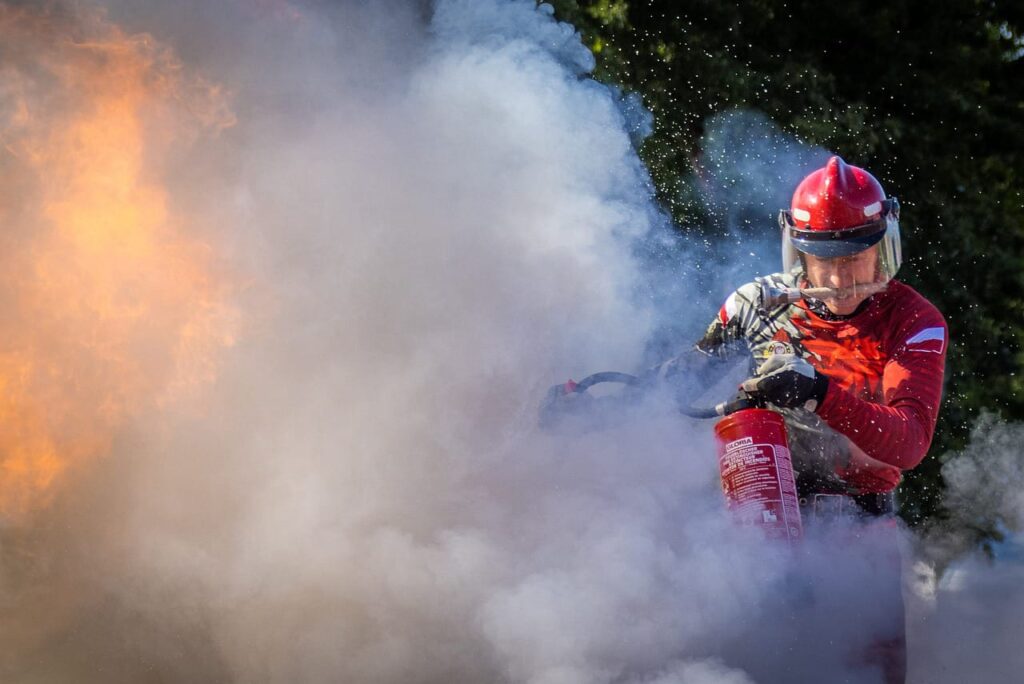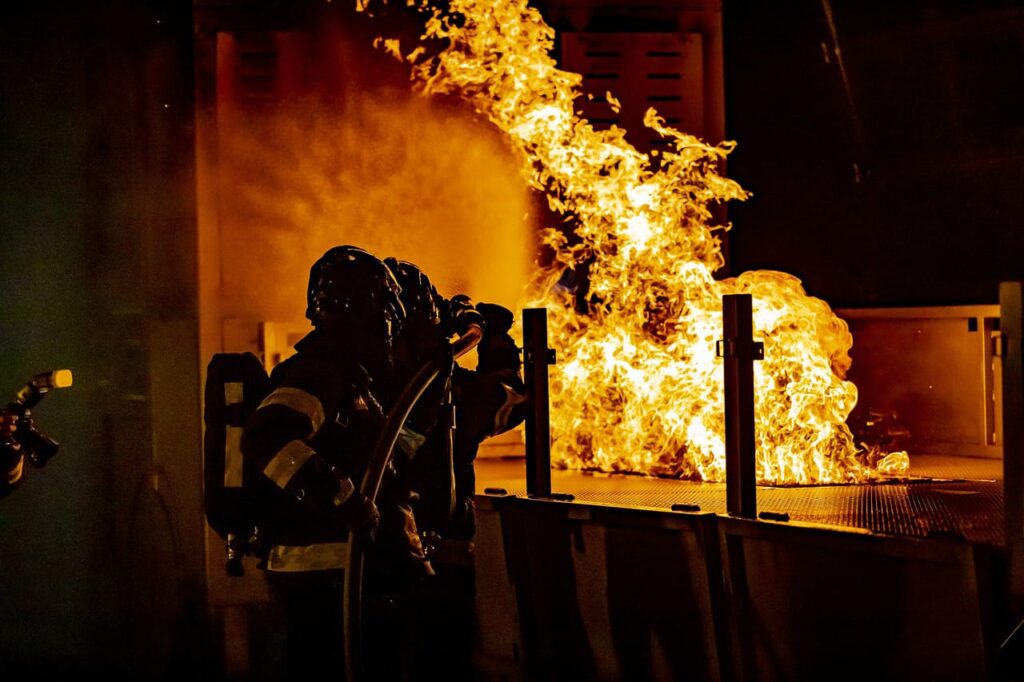Fire Alarm is a system. An alarm warns people of potential smoke, fire, and carbon monoxide incidents. People can be manually triggered by smoke, spotting flames, and a burning smell. It is made up of several components, including :
- Save Lives: A fire alarm protects the building from fire for employees, tenants, and customers. By giving ample time to evacuate in an orderly fashion, a combination of heat detectors and smoke, sirens, bells, and strobe lights detects fire and alerts building occupants.
- Reduce Properly Loss: They alert the people who can, while strobe lights and sirens don’t don’t don’t actively put out fires. When trained personnel attack a small fire with an extinguisher and bystanders, guests, or employees call the fire department, the fire control process begins. Fire trucks dispatch to the location without delay, and monitored fire alarm systems automatically notify emergency responders. The sooner the fire is extinguished and the less damage your building sustains, the faster these responses happen.
- Shorten your recovery time: Less building damage means shorter downtime until you can reopen for business. This allows you to return to business as usual before long, cutting your losses from the fire even more.
- Increase property value: By increasing their value, fire alarms can make properties more appealing to buyers.
- Protect your workforce: By giving them time to take action, fire alarms alert employees as soon as a fire starts.
- Ensure Compliance: By helping reduce fire-related issues, Businesses should comply with the latest legislation.
- Ensure Proper functionality: Regularly, any issues should be fixed, and fire alarms should be tested.
- Notification appliance: Visual and audible alerts are provided by these, such as horns, speakers, or strobes.
Smoke Alarms
Smoke alarms are critical early warning systems for fire prevention. They are often the reason everyone escapes the home safely. The most important thing about smoke alarms is that they work even if the home burns.
The maintenance and placement of smoke alarms in the home are crucial to maximizing their effectiveness and value. The importance of smoke alarms for protecting life and limbs is hard to overstate, so try to remember that next time one of your smoke alarms starts.
Where To Install Smoke Alarms :
- Install smoke alarms outside every sleeping area, inside every bedroom, and on every floor of the home, including the basement.
- At least 10 feet away from the kitchen to prevent alarms, keep smoke alarms.
- Place fire alarms high up or on the ceiling or walls near the ceiling.
- Use a home security system like smoke alarms and other environment sensors.
- Install smoke alarms with strobe lights and bed shakers.
How To Maintain Smoke Alarms :
- At least once a month, test your smoke.
- At least once a year, change the batteries in your smoke and remember to replace the batteries in your carbon monoxide detectors at the same time. A combined smoke and CO detector, Google Nest offers nest protection, and a CO detector works with the Nest Secure System, for example.
- -Complete replacement smoke alarms.
Safety Tips for Driving on Icy Roads
Winter weather is coming, so icy roads are part of the job for many drivers. These essential tips for navigating slippery roads:
- Reduce Your Speed: Icy roads mean slower travel. Allow extra time to reach your destination, and keep speeds low to help maintain control.
- Increase Following Distance: Double the average following distance to ensure you have plenty of space to react if vehicles ahead suddenly slow down.
- Gentle on the Brakes: Avoid sudden braking; Instead, ease off the accelerator and brake slowly to avoid skidding.
- Stay Alert in Low Visibility: Ice and snow can reduce visibility. Especially on bridges and shaded areas. Use your headlights and watch for any signs of black ice,
- Avoid Cruise Control: When driving on icy or slippery roads, turn off cruise control to better control yourself if you start skidding.
- Prepare for the Unexpected: Keeping essential winter supplies like blankets, extra food and water, and a first aid kit in case of delays.
Safety is key to every journey, so let’s stay vigilant, especially in winter weather. Share these tips with your fellow drivers, and stay safe this season!
Tips for Flash Flood Safety
staying safe is essential, With heavy rainfall over the past 12 hours and flash flood warnings in effect. Here are some essential tips for your property and to protect yourself during flooding:
- Avoid Driving Through Flooded Roads:
- Just a few inches of water can sweep a car away. Turn around—don’t risk it if you see water on the road.
- Move to Higher Ground:
- Seek higher ground immediately If flooding threatens your area. Until water levels rise further, Don’tDon’tDon’t wait.
- Keep Electronics and Important Items Elevated”’
- Move valuable belongings, electronics, and important documents to higher levels in your home to avoid damage.
- Stay Informed :
- Listen to local weather updates or alerts and Keep your phone charged.
- Avoid Contact with Floodwater
- Floodwater can carry harmful contaminants and debris. If you need to go outside, Wear waterproof boots.
Take Special Fire Precautions in the Kitchen
We’ve compiled a handy list here for you to follow:
- When you are cooking, never leave the kitchen. Turn off the burner if you need to go. Check on it from time to time if you’re baking or roasting something in the oven. How much time has elapsed? Use a kitchen timer to remind you.
- Be attentive when every time you cook. Concentrate on what you’re doing.
- Keep flammable things like dishcloths and paper towels away from stovetops and burners.
- Be Ensure that your cooking surfaces are grease-free and clean.
- By using your kitchen appliances wisely.
- By unplugging them when you’re not using them, you can ensure that the kitchen equipment you buy passes fire safety standards.
Keep Oils And Gases Away From Flames, And Sparks
Keep it away from the stove or anything that could spark and cause a fire; if you keep cooking oil in your kitchen, you want. Your lawnmower or anything else. The same goes for gas that you might keep in a garage for your car.
You want to keep the gas away from a potential flame or spark. By carefully containing these things in approved containers, cutting your risk of problems at the same time, and keeping them a safe distance away from anything that could react with them, you’re going to be better prepared
Get The Furnace Checked
there are some things that you just aren’t able to do yourself, No matter what you’re doing to protect your home.
Scheduling regular maintenance and getting your furnace looked at regularly will always be necessary.
Your furnace will keep working the right way and will not put you in any danger of fire—a professional can make sure. A broken furnace could be a considerable danger to the safety of the home. Monitoring and maintenance stop the problems before they even show up.
You can and should be doing plenty of things to ensure that you don’t have to worry as much about the potential for fire and keep your house safer.
You want to make sure you are putting your effort into prevention when you do everything right, but at the same time, because fires can sometimes pop up, There’s always a risk because it means your family is safer than ever. By doing this, which will be worth the time and effort it takes, you cut any risks drastically.


